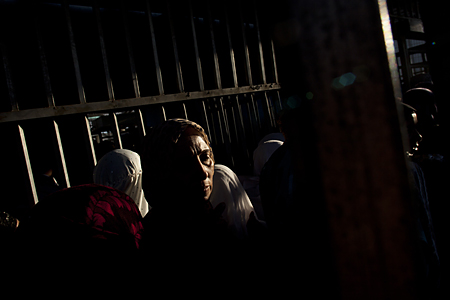
Palestinian women attempt to pass the checkpoint on their way to pray at the Al Aqsa Mosque on the second Friday of the Muslim holy month of Ramadan, in the West Bank town of Bethlehem, August 12, 2011. (Photo: Bernat Armangue / AP)
The Palestinian Authority has set the date: Sept. 20, a Tuesday, is the day it will ask the United Nations for membership. As for what comes the day after, well, that’s a good deal less clear, and efforts to read the murk betray only intentions.
An Israeli legal expert predicts chaos.
“There are huge legal consequences of establishment of a state which I cannot overstress,” says Daniel Reisner, a longtime peace negotiator for Israel as well as former head of international law for the Israel military. “All of the legal documents we ever signed with the Palestinians [will be] kaput,” Reisner says. These cover water, finances, electricity, the daily transit of Palestinian workers in and out of Israel – the basic mechanics of civil administration for the generation since the Oslo Accords. “There’s a huge potential for legal chaos,” he says.
Palestinian officials beg to differ. Acceptance by the U.N., they say, will merely enhance the Palestinian position in its struggle to remove Israeli forces from the West Bank, partly by subjecting the Jewish state to a conspicuous diplomatic loss, but also by bringing into play assorted mechanisms of international justice.
“[The Israelis] are threatening Armageddon,” says Hanan Ashrawi, a member of the PLO executive committee who long served as spokesperson for Palestinian negotiators. “Their legal advice is wrong, actually. Palestine sought and received global recognition in 1988. We’ve been there. We’ve done that. That doesn’t negate any signed agreements. It has the effect of reinforcing them.”
Who’s right? It just might be possible to know if it were clear just what Palestinian leaders intend to do in New York next month. But they are holding their cards closely, if they have looked at them at all. If, indeed, they have all been dealt.
By their own account, the Palestinians will ask the member states who together make up General Assembly to vote Palestine into its ranks. Ashrawi says Ramallah is counting on yes votes from 122 of 193 members, but may gather as many as 130, winning the required two-thirds majority.
But U.N. rules clearly state that new members must start with the Security Council, where the United States holds a permanent seat, and Washington has vowed to veto a Palestinian application, in order to protect Israel. Palestinian leaders must decide whether to try anyway, and irk the Obama Administration yet again. (Both sides are still chafing from the U.S. veto last February of a resolution condemning Israeli settlements on the West Bank.) There’s also the real possibility that the U.S. Congress will cut off vital aid dollars to the Palestinian Authority.
“We are going to the UN with all options open,” Ashrawi says. “It’s not a one-time thing. It’s not a panacea or a cure. It’s a connective thing to place the Palestinian question in the center of the international arena.”
It’s also a gamesmanship thing. Palestinian Authority president Mahmoud Abbas, widely known as Abu Mazen, succeeded the grizzled militant Yasser Arafat in order to negotiate an end to the conflict with Israel. But there have been no significant talks since Benjamin Netanyahu returned to the Prime Minister’s office in 2009. The U.N. bid is widely understood as a Palestinian tactic to help Israel see negotiation as preferable to a roll call of international approbation.
As Ashrawi put it at a new conference the PLO Building on Sunday: “We don’t see this as conflicting with any negotiations.”
The problem is expectations. For two years, Abbas’ prime minister, Salam Fayyad, has used the prospect of statehood as a clarion call for shoring up governance on the West Bank (the Palestinian territory the secular Fatah political faction still controls; despite a declared reconciliation between Fatah and Hamas, the Gaza Strip and its 1.5 million residents remains governed by the Islamist militants). Palestinians duly responded. A July poll by the respected Palestinian Center for Policy and Survey Research found overwhelmingly support for the sovereignty bid. The survey also found that three out of four Palestinians want their government to walk the walk, following up physically after September by sending Palestinian police into areas controlled by Israeli troops and starting construction on an airport, never mind the consequences.
It’s a Day After that much more resembles the warnings from Israel than the graduated, cooly diplomatic course laid out by Dr. Ashrawi, who has a Ph.D. in comparative literature. “This is part of a holistic policy which is peaceful, which is logical,” she says. “We don’t accept the rules of the game as they impose them on us….This is a constructive alternative.”

